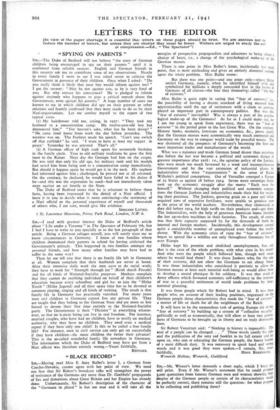" BLACK RECORD "
Sne,—Having read Miss E. Amy Buller's letter 1, a German from Czecho-Slovakia, cannot agree with her point of view. We need not fear that Sir Robert's broadcast talks will strengthen the power of resistance of the Germans any more than Dr. Goebbels' propaganda of lies and distortions about Great Britain and her Empire has already done. Unfortunately, Sir Robert's description of the character of the " Germans in plural " is but too true and it will take all the
energies of prospective propagandists and educators to bring about a change of heart, i.e., a change of the psychological make-up of the German masses.
There is one point in Miss Buller's letter, incidentally her main point, that is most misleading and gives an entirely distorted outlook upon the whole problem. Miss Buller wrote:
But there was one point—and one point only—where Hitler
united Germany, namely, when he identified himself with and symbolised for millions a deeply concealed fear in the hearts of Germans of all classes—the fear they themselves called "the fear of existent."
Miss Buller is quite right in saying that "fear of existent," i.e., the possibility of having a decent standard of living secured from apprenticeship until the age of retirement with a claim to pension. played an important part in contemporary politics. But was this "fear of existenz" inevitable? Was it always a part of the psycho- logical make-up of the Germans? As far as I could make out, for I am too young to speak from experience, there was no " feat of existenz" in the period prior to the last Great War. On the contrary. History books, memoirs, literature on economics, &c., prove clearly that the German masses were, economically very much contented and Germany on the way to conquer world trade by peaceful means. The war shattered all the prospects of Germany's becoming the first and
• most important trader and manufacturer of the world.
What was a nuisance and made German bread dearer than anywhere else before the last war became a political and economic danger of greatest importance after 1918: i.e., the agrarian policy of the Junkers, who were much too much favoured by a weak and incomprehensive Government and by the vast extension of industrial plants by industrialists who were "expansionists" in the sense of Kaiser Wilhelm's political conceptions. Out of Versailles emerged a Europe of 25 States as against 18 before 1914. Seven more sovereign States took up the economic struggle after the mono " Each man for himself." Without changing their political and economic concep- tions the German Junkers and industrialists made their bid for retain- ing their positions. The Junkers, growing grain on a poor soil which required tons of expensive fertilisers, were unable to produce corn at the price of the world markets. Nevertheless, they clamoured, as they did before 1914, for high tariffs on their products and—got them. The industrialists, with the help of generous American loans, installed the last up-to-date machines in their factories. The result, of course, was that their capacity surpassed by far the demands of both the internal and foreign markets. Incidentally, this development created quite a considerable number of unemployed even before the world- slump. With the economic crisis of 1929 the " fear of existent" began to spread like a wildfire not only throughout Germany but all over Europe.
Hitler kept his promise and abolished unemployment, but, and that is the crux of the whole problem, with what aims in his mind? And who were the people which followed him, though well aware where he would lead them? It was those Junkers who, for the sake of their existenz, did not allow the Germans to eat cheap bread. It was those industrialists who considered it patriotic to allow the German masses at least such material well-being as would allow them to develop a sound physique fit fo'r soldiery. It was that stock of Army officers which favoured economic self-sufficiency in the interests of war to a peaceful settlement of world trade problems by inter- national planning.
It was those people which Sir Robert had in mind. It was these people who, on account of their leading positions, impressed on th,e, German people those characteristics that made the " fear of existent" a matter of life or death for all the neighbours of the Reich.
It will have to be the tremendous task of getting Europe rid of rbr,s, "fear of existenz" by building up a system of "collective securith politically as well as economically, that will allow at least two genera- tions of Germans to be brought up in liberty and on truly democratic lines.
Sir Robert Vansittart said: " Nothing in history is impossible. The soul of a people can be changed. . . ." These words justify his talks and the publication of the very sad booklet to its full extent and 121 upon us, who aim at educating the German people, the heavy Mudd of a most difficult duty. It was necessary to speak hard and strong words and it was good they were spoken.—I remain, Sir, P015 faithfully,
HAMS ROSENBERG.






























 Previous page
Previous page